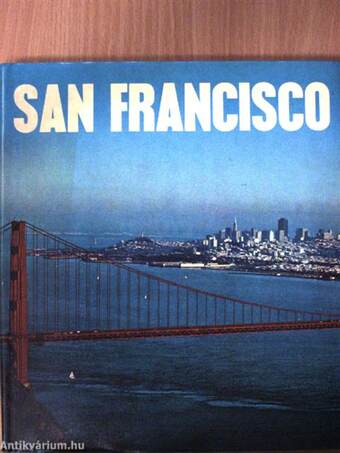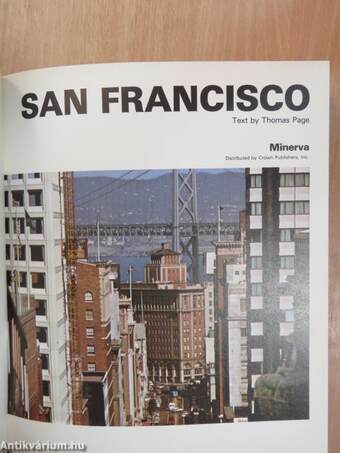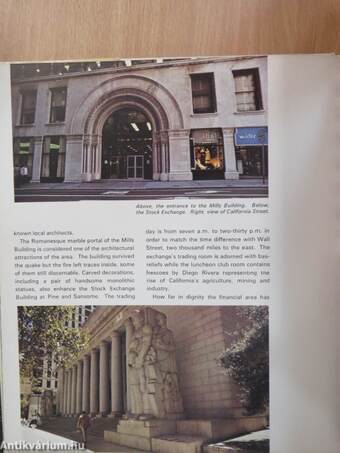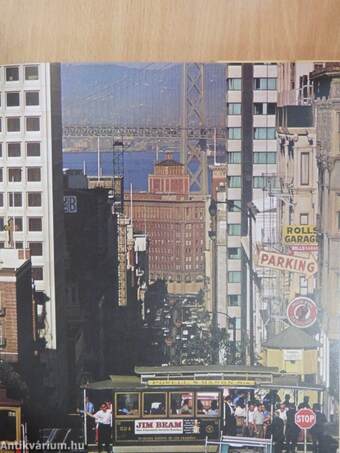1.118.325
kiadvánnyal nyújtjuk Magyarország legnagyobb antikvár könyv-kínálatát
San Francisco
| Kiadó: | Minerva |
|---|---|
| Kiadás helye: | Budapest |
| Kiadás éve: | |
| Kötés típusa: | Vászon |
| Oldalszám: | 95 oldal |
| Sorozatcím: | |
| Kötetszám: | |
| Nyelv: | Angol |
| Méret: | 26 cm x 23 cm |
| ISBN: | 0-517-24115-3 |
| Megjegyzés: | Színes fotókkal gazdagon illusztrálva. |
naponta értesítjük a beérkező friss
kiadványokról
naponta értesítjük a beérkező friss
kiadványokról
Előszó
1.
It began as an earthen concussion on the
seabed, under forty fathoms of water, whose
shock waves buckled the keel plates of ships
and tumbled crewmen violently out of their
bunks. By the... Tovább
Előszó
1.
It began as an earthen concussion on the
seabed, under forty fathoms of water, whose
shock waves buckled the keel plates of ships
and tumbled crewmen violently out of their
bunks. By the time they dashed to their
portholes, the calm sea was littered with the
carcasses of fish killed by the shock, drifting
slowly to the surface.
From a point one hundred miles west of
the shoreline, and ninety miles north of the
Bay Area, it roared out of the ocean at a
speed of seven thousand miles an hour,
shattering and rocking the Point Arena light-
house; then it veered south in a crazed zig-
zag path that jumped in and out of the sea,
derailing trains, shifting trees far from their
roots and toppling others ana killing live-
stock. An entire sawmill fell into a yawning
split that opened up beneath it. A redwood
tree was then deposited over it as a tomb-
stone. Water and gas pipes split- and burst
deep underground. By the time it slammed
under the city, San Francisco's reserve water
supply was gone.
At 5:13 on the morning of April 18th
1 906, while most of the city residents stirred
under their sheets against the soft dawn
light, the greatest recorded natural catastro-
phe to hit the North American continent
struck the city of San Francisco. From every-
where rose the clanging of church bells ring-
ing of their own accord, accompanied by the
thunderous cracks of splitting masonry and
collapsing buildings.
A police sergeant on morning duty saw it
come down Washington Street "as if the
waves of the ocean were coming towards
me, billowing as they came". From his studio
high atop Russian Hill the painter Bailey
Millard gaped as the entire city rocked back
and forth as if being pushed into the bay.
South of Market Street the three-foot
waves of earth suddenly stopped rolling.
Ten seconds of terrifying silence followed;
then the second and third shocks burst over
the shattered, toppling city and the fires
began from thousands of leaking gas mains.
Enrico Caruso's manager ran into the
singer's Palace Hotel suite to find the tenor
sitting bolt upright in bed, eyes bulging in
terror, his forty pairs of boots and loads of
clothing scattered from fallen dressers across
the floor. The manager ordered the frighten-
ed singer to try his voice out the window and
calm the panic-stricken crowds below. After
several false starts Caruso managed to sing,
his clear, pure tones softening the disastrous
bedlam below. It is said to have been the
greatest performance of his life.
Brigadier General Frederick Funston, War
Hero, Medal of Honor winner, Commander
of the Presidio Garrison, which was one of Vissza
Témakörök
- Idegennyelv > Idegennyelvű könyvek > Angol > Művészetek > Fotóművészet
- Idegennyelv > Idegennyelvű könyvek > Angol > Helytörténet
- Helytörténet > Külföldi > Városok
- Művészetek > Fotóművészet > Albumok > Tematikus
- Művészetek > Fotóművészet > Idegen nyelv > Angol
- Művészetek > Fotóművészet > Témái > Városok > Külföldi
Thomas Page
Thomas Page műveinek az Antikvarium.hu-n kapható vagy előjegyezhető listáját itt tekintheti meg: Thomas Page könyvek, művekMegvásárolható példányok
Nincs megvásárolható példány
A könyv összes megrendelhető példánya elfogyott. Ha kívánja, előjegyezheti a könyvet, és amint a könyv egy újabb példánya elérhető lesz, értesítjük.








